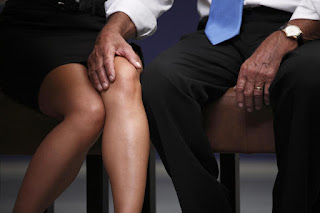 By Olivia Petter: An increase in male unemployment leads to more sex discrimination against women, a US study published in Harvard Business Review has found.
By Olivia Petter: An increase in male unemployment leads to more sex discrimination against women, a US study published in Harvard Business Review has found. Just as we’re pushing towards a desired state of parity within the workplace – campaigns to close the pay gap, backlash at the BBC’s published salaries etc - it transpires that there's a dark downside for women which has been unexamined until now.
Sexual harassment claims made to the Federal Equal Employment Opportunity Commission have risen by roughly 10 per cent in the last 20 years, the study reveals.
After Dan Cassino analysed of data from the EEOC and Bureau of Labor Statistics, he found that sex discrimination spikes when men fall behind women in the workforce.
The political sciences professor revealed that when the unemployment rate of married men (8 per cent) is double that of women (4 per cent), sex discrimination complaints are expected to rise by 101 per cent.
The results are particularly staggering considering that only 30 per cent of sexual harassment cases are reported and therefore the aforementioned rise in allegations is probably much higher than data can even prove.
Similarly, a 2003 study from researchers at the University of Padova threatened some men’s gender roles, and subsequently gave them the opportunity to engage in sexual harassment.
The men were given a series of tasks to perform and after which were required to select an image out of a selection (which included pornographic images) to the women who had completed the same task.
Half the group were told that women were intrinsically better at the task, whilst the other half were left to their own devices.
The men who had been told that women were naturally better at the task – and therefore felt inherently threatened – were more likely to send pornographic images.
So, the million dollar question is why on earth are men more likely to sexually harass a woman when they are – pragmatically speaking - professionally inferior to them?
“Maybe there’s more sex discrimination because there are relatively more women in the workplace, for example. But that wouldn’t explain why the effect is contingent on the relative levels of men and women’s unemployment.”
Certainly, it’s worth noting that one in six of the complaints recorded are made by men – but that proportion has remained stable over time, regardless of male and female unemployment rates.
Cassino argues that the results boil down to men asserting their dominance in response to feeling that their masculinity has been compromised.
In other words, threatened masculinity increases the likelihood of sex discrimination.
“Traditionally, being the breadwinner is an important part of men’s — especially married men’s — gender identity, and when that role comes under threat, men assert their masculinity in other ways,” explains Cassino.
There is a plethora of data to prove demonstrating the psychological damages inferred when a man experiences gender-role harassment.
It’s an issue that predates modern culture all the way back to Shakespearean times.
There’s a reason why Lady Macbeth is finally able to convince her husband to kill King Duncan by putting his masculinity in jeopardy: “When you durst do it, then you were a man,” the iconic character proclaims.
“The good news is that there are constructive ways for men to assert their gender identity, and a workplace that gives men those sorts of outlets may be better positioned to prevent sex discrimination,” Cassino concludes.
Source
No comments:
Post a Comment